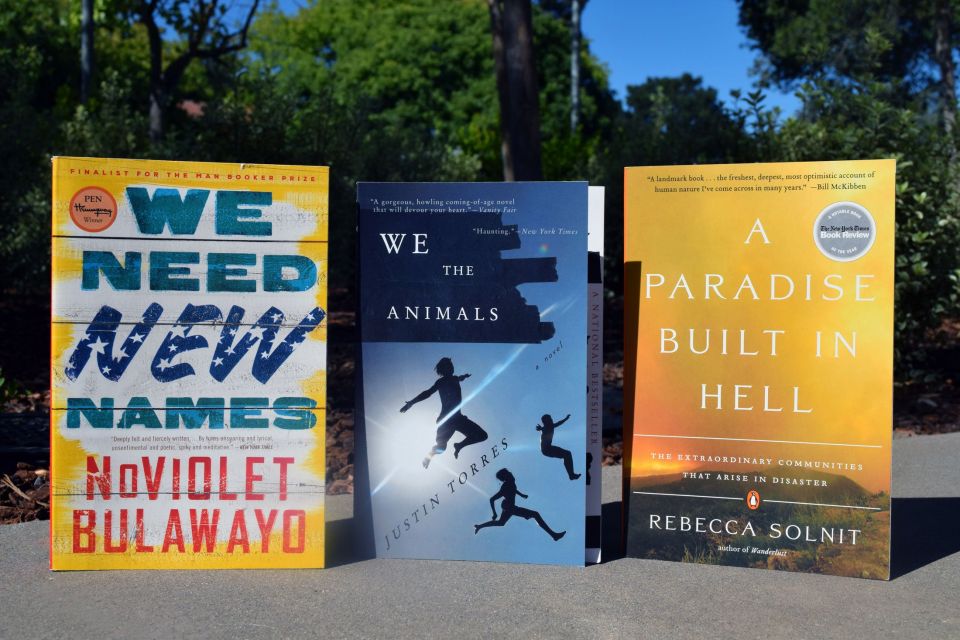In recent weeks, Stanford launched its annual Three Books program by mailing each member of the Class of 2020 and incoming transfer students their first reading assignment – two novels and a nonfiction book.
The university sent packages of books to incoming students living in 70 countries.

The three books sent to incoming Stanford freshmen and transfer students this summer were chosen by English Professor Elizabeth Tallent. (Image credit: Kate Chesley)
Stanford English Professor Elizabeth Tallent selected this year’s books: We the Animals, a novel by Justin Torres, a former Stegner Fellow at Stanford; We Need New Names, a novel by NoViolet Bulawayo, an instructor in Stanford’s Creative Writing Program who also is a former Stegner Fellow; and A Paradise Built in Hell: The Extraordinary Communities That Arise in Disaster, a nonfiction book by Rebecca Solnit, a writer, historian and activist who lives in San Francisco.
- We the Animals, published in 2011, is the story – set in the near past – of three young brothers, tightly bound and fiercely loyal to one another, who live with their Puerto Rican father and white mother in upstate New York. The hectic lives of the parents leave them little time or patience to control a pack of rambunctious boys, making life in their topsy-turvy household intense, chaotic and loud.
- We Need New Names, published in 2013, is the unflinching and powerful story of a young girl’s journey out of modern-day Zimbabwe and to America. Darling is only 10 years old, and yet she must navigate a fragile and violent world. When she escapes to suburban America, she finds that – far from the comforts of her childhood community – America’s abundance is hard to reach, and she reckons alone with the sacrifices and mixed rewards of assimilating.
- A Paradise Built in Hell: The Extraordinary Communities That Arise in Disaster, published in 2010, explores the social consequences of five major disasters, including the 1906 San Francisco earthquake, lower Manhattan after the 9/11 terrorist attacks, and Hurricane Katrina’s 2005 deluge of New Orleans. Solnit concludes that the most startling thing about disasters is not merely that so many people rise to the occasion, but that they do so with joy.
In August the students will have an opportunity to participate in online chats with faculty, administrators and classmates – sharing thoughts, idea and perspectives. During New Student Orientation, there will be a roundtable discussion with the authors, moderated by Tallent. Students will have an opportunity to ask the authors questions. Following the program, there will be further discussion of the readings in the student residences.
Tallent said the three books are very different in style, voice and genre, but share a fascination with human resourcefulness in the face of trauma.
“In Justin Torres’ We the Animals, the ‘we’ of the title is a tightly bonded trio of brothers whose mutual love and savagery offer rough sanctuary within their volatile world,” said Tallent, whose fourth collection of short stories, Mendocino Fire, was published in 2015.
“We Need New Names, by NoViolet Bulawayo, gives us a different ‘we’ with its closely observed chronicle of loss, vulnerability and persistence, first within its bold protagonist’s troubled homeland, Zimbabwe, and then in her new country, America, where trouble takes different forms,” she continued.
“Rebecca Solnit’s nonfiction chronicle, A Paradise Built in Hell, takes the entrenched narrative of catastrophe bringing out the worst in us, the most violent, lawless, selfish behavior, and holds it up against historical accounts of collective bravery, radical kindness, profound generosity.”
Tallent said the three books are concerned “with how to come through a crisis that dismantles the world as you’ve known it.”
“If I was in a generalizing mood, I would say that’s the plot of all the greatest stories,” she said. “I’m hoping each incoming student will get the feeling of being caught up in a really great story.”